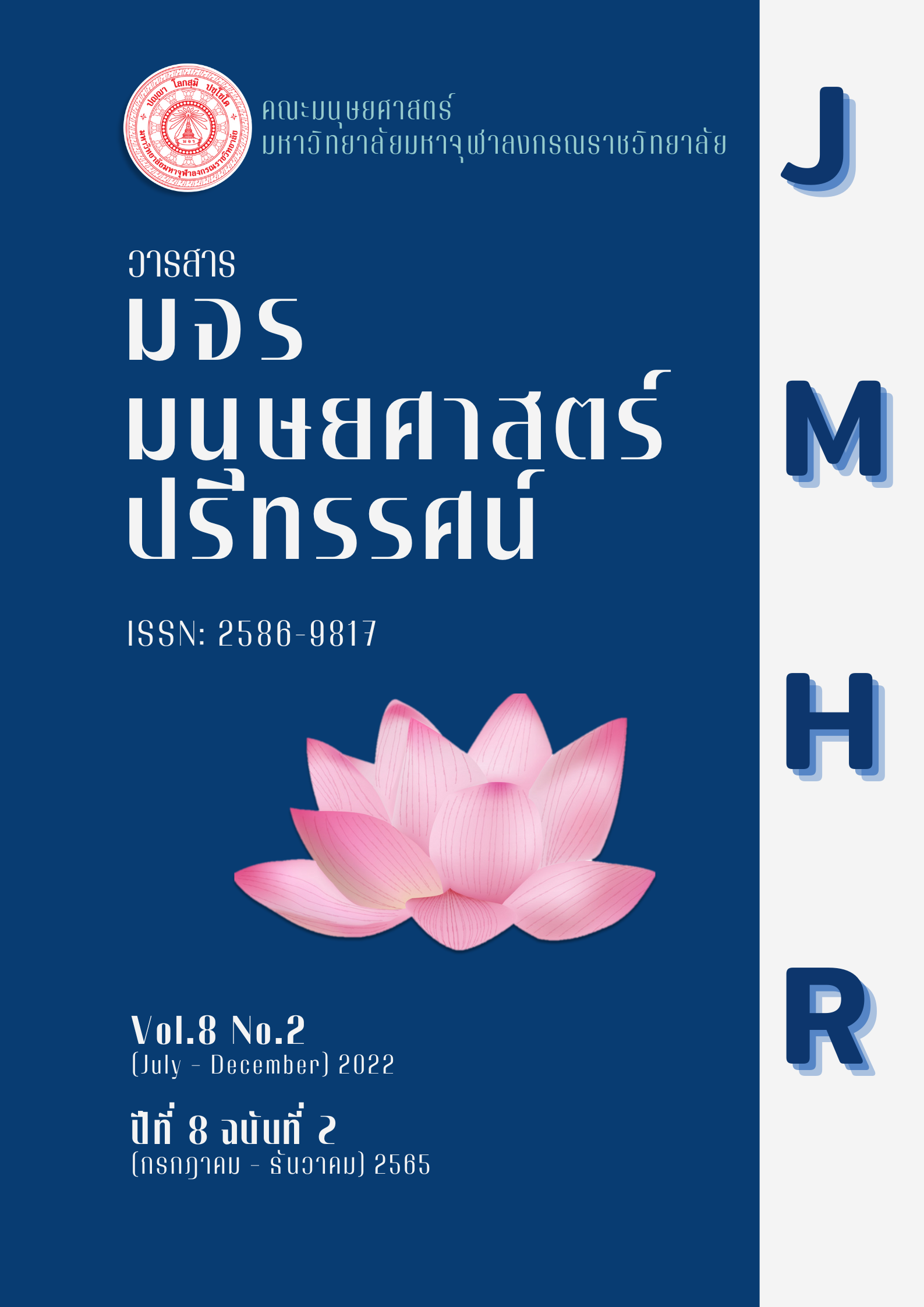โปรแกรมการส่งเสริมสุขภาพตามแนวพุทธจิตวิทยาเพื่อบรรเทาอาการ ออฟฟิศซินโดรมของบุคลากรสายเทคโนโลยีสารสนเทศ
คำสำคัญ:
ความรอบรู้ด้านสุขภาพ, พฤติกรรมสุขภาพ, หลักไตรสิกขา, บุคลากรด้านเทคโนโลยีสารสนเทศ, ออฟฟิศซินโดรมบทคัดย่อ
บทความวิจัยนี้มีวัตถุประสงค์ เพื่อ 1. ศึกษาสถานการณ์ระดับความรอบรู้ด้านสุขภาพของบุคลากรสายเทคโนโลยีสารสนเทศเกี่ยวกับการบรรเทาอาการออฟฟิศซินโดรมของบุคลากรสายเทคโนโลยีสารสนเทศ 2. พัฒนาโปรแกรมการส่งเสริมสุขภาพตามแนวพุทธจิตวิทยาเพื่อบรรเทาอาการออฟฟิศซินโดรม 3. นำเสนอประสิทธิผลของโปรแกรมการส่งเสริมสุขภาพตามแนวพุทธจิตวิทยาเพื่อบรรเทาอาการออฟฟิศซินโดรม การวิจัยเป็นแบบผสานวิธี วิจัยเชิงคุณภาพและเชิงปริมาณ ผู้ให้ข้อมูลสำคัญ คือ ผู้เชี่ยวชาญด้านพุทธศาสนา ด้านสาธารณสุข และกลุ่มนักปฏิบัติการ จำนวน 12 รูป/คน คัดเลือกแบบเจาะจง ประชากร ได้แก่บุคลากรสายเทคโนโลยีสารสนเทศ จำนวน 268 คน ในการตอบแบบสำรวจ กลุ่มตัวอย่าง จำนวน 30 คน คัดเลือกแบบเจาะจง แบ่งเป็นกลุ่มทดลองและควบคุมกลุ่มละ 15 คน วิเคราะห์เชิงคุณภาพด้วยการวิเคราะห์เนื้อหา วิเคราะห์เชิงปริมาณใช้สถิติพื้นฐานร้อยละ ค่าเฉลี่ย และส่วนเบี่ยงเบนมาตรฐาน ทดสอบสมมติฐานด้วย Wilcoxon signed-rank test
ผลการวิจัย พบว่า 1. ผลสำรวจระดับความรอบรู้ด้านสุขภาพเกี่ยวกับการบรรเทาอาการออฟฟิศซินโดรม โดยรวมอยู่ในระดับ พอใช้ 2. การพัฒนาโปรแกรมการส่งเสริมสุขภาพตามแนวพุทธจิตวิทยาเพื่อบรรเทาอาการออฟฟิศซินโดรมของบุคลากรสายเทคโนโลยีสารสนเทศ มี 6 องค์ประกอบ โดยมีกระบวนการจัดกิจกรรมตามดามโปรแกรม ที่ชื่อว่า “I BE SMART” และ 3) ประสิทธิผลของโปรแกรมการส่งเสริมสุขภาพตามแนวพุทธจิตวิทยาเพื่อบรรเทาอาการออฟฟิศซินโดรม พบว่า 1) ค่าเฉลี่ยความรอบรู้ด้านสุขภาพและพฤติกรรมสุขภาพกลุ่มทดลองสูงกว่ากลุ่มควบคุมอย่างมีนัยสำคัญทางสถิติที่ระดับ .05 2) ค่าเฉลี่ยความรอบรู้ด้านและพฤติกรรมสุขภาพของกลุ่มทดลองหลังทดลองสูงกว่าก่อนทดลองอย่างมีนัยสำคัญทางสถิติที่ระดับ .05 3) ค่าเฉลี่ยความพึงพอใจอยู่ในระดับพึงพอใจมากที่สุด
เอกสารอ้างอิง
ขวัญเมือง แก้วดำเกิง. (2561). ความรอบรู้ด้านสุขภาพ เข้าถึง เข้าใจ และนำไปใช้ (พิมพ์ครั้งที่ 2). กรุงเทพฯ : อมรินทร์พริ้นติ้ง.
ชูชีพ โพชะจา. (2561). รูปแบบการเจริญสติเพื่อส่งเสริมพฤติกรรมการควบคุมระดับน้ำตาลในเลือดของผู้ป่วยโรคเบาหวาน (ดุษฏีนิพนธ์พุทธศาสตรดุษฏีบัณฑิต). มหาจุฬาลงกรณราชวิทยาลัย : พระนครศรีอยุธยา.
ธันยวงศ์ เศรษฐพิทักษ์. (2558). ปัจจัยที่ส่งผลให้พนักงานออฟฟิศทำงานติดต่อกันเป็นระยะเวลานานและเป็นโรคคอมพิวเตอร์ซินโดรม (วิทยานิพนธ์บริหารธุรกิจมหาบัณฑิต). มหาวิทยาลัยธรรมศาสตร์ : กรุงเทพฯ.
แผนพัฒนาเศรษฐกิจและสังคมแห่งชาติ. (2560-2564). คณะกรรมการพัฒนาการเศรษฐกิจและสังคมแห่งชาติ. สำนักนายกรัฐมนตรี, ฉบับที่ 12:16.
พงษ์จันทร์ อยู่แพทย์.(2561). การยศาสตร์และสรีรวิทยาของการทำงาน. ปทุมธานี: สำนักพิมพ์มหาวิทยาลัยรังสิต.
พเยาว์ พงษ์ศักดิ์ชาติ. (2562). ผลของโปรแกรมพัฒนาความรอบรู้ด้านสุขภาพ และพฤติกรรมสุขภาพ 3 อ. ตามภูมิปัญญาท้องถิ่น ของนักศึกษาพยาบาล วิทยาลัยพยาบาลสังกัดสถาบันพระบรมราชชนก กระทรวงสาธารณสุข. วารสารวิจัยสุขภาพและการพยาบาล, 25(2 พฤษภาคม-สิงหาคม), 199-207.
พิทยา ไพบูลย์ศิริ. (2561). ความรอบรู้ด้านสุขภาพและพฤติกรรมสุขภาพ 3อ.2ส. ของผู้บริหารภาครัฐ จังหวัดพระนครศรีอยุธยา. วารสารสมาคมเวชศาสตร์ป้องกันแห่งประเทศไทย, 8(1 มกราคม-เมษายน), 98.
รัตนา มูลคำ. (2556). ผลของการออกกำลังกายแบบโยคะต่ออาการปวดคอและไหล่ในพนักงานสำนักงานที่ทำงานกับคอมพิวเตอร์ (วิทยานิพนธ์พยาบาลศาสตรมหาบัณฑิต). มหาวิทยาลัยเชียงใหม่ : เชียงใหม่.
สมพร กันทรดุษฏี-เตรียมชัยศรี. (2554). สมาธิบำบัดแบบ SKT รักษาสารพัดโรคได้ด้วยตนเอง. กรุงเทพมหานคร: สำนักพิมพ์ปัญญาชน.
สำนักงานส่งเสริมสุขภาพ กรมอนามัย กระทรวงสาธารณสุข. (2564). การส่งเสริมสุขภาพ เพื่อพิชิตออฟฟิศซินโดรมในกลุ่มวัยทำงาน. กรุงเทพมหานคร: กรมอนามัย กระทรวงสาธารณสุข.
อังศินันท์ อินทรกำแหง. (2560). ความรอบรู้ด้านสุขภาพการวัดและการพัฒนา. กรุงเทพฯ : สำนักพิมพ์ บริษัท สุขุมวิทยการพิมพ์ จำกัด.
Sorensen K., Broucke S., Fullam J, Doyle G., Jürgen P., Slonska Z. & Helmut B. (2020). Health literacy and public health: A systematic review and integration of definitions and models. BMC Public Health. Retrieved May 23, 2020, from http://www.biomedcentral.com/1471-2458/12/80 12-80.

ดาวน์โหลด
เผยแพร่แล้ว
รูปแบบการอ้างอิง
ฉบับ
ประเภทบทความ
หมวดหมู่
สัญญาอนุญาต
ลิขสิทธิ์ (c) 2022 วารสาร มจร มนุษยศาสตร์ปริทรรศน์

อนุญาตภายใต้เงื่อนไข Creative Commons Attribution-NonCommercial-NoDerivatives 4.0 International License.





